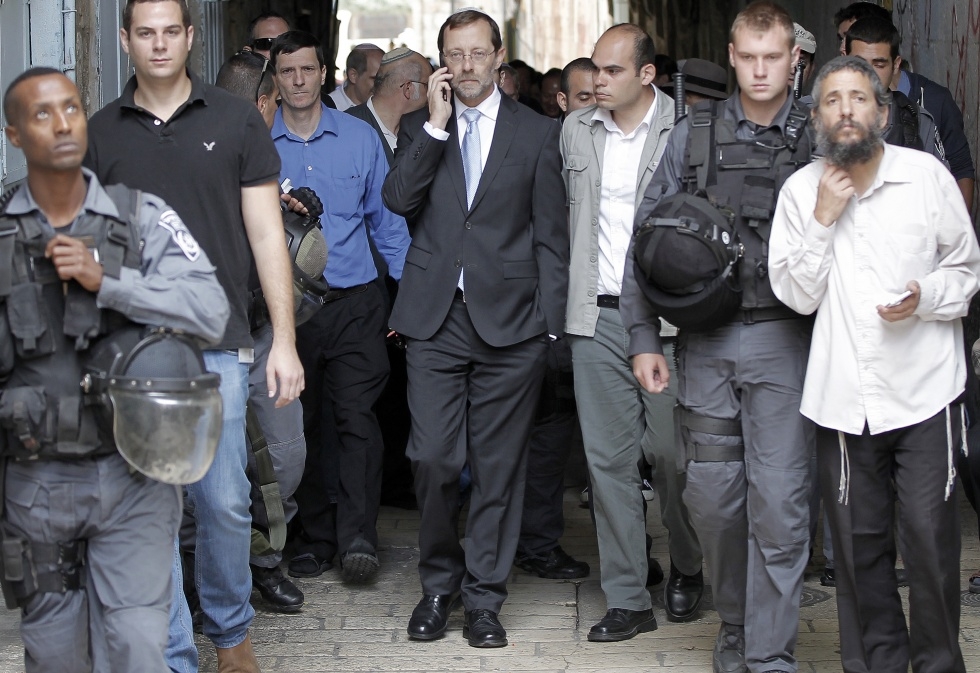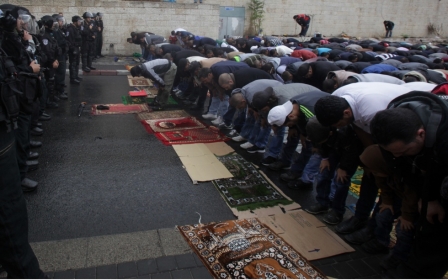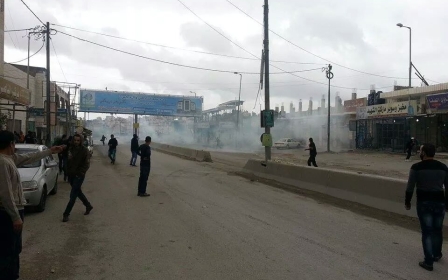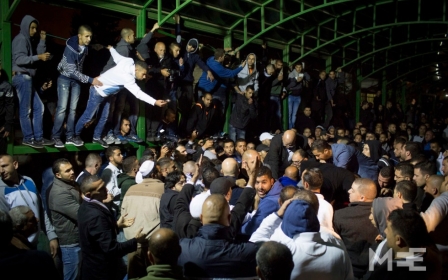Netanyahu faces criticism as Jerusalem tensions rise
Peres and Livni both criticise the Israeli government as provocations continue around the Al-Aqsa mosque

Far-right member of the Israeli Knesset Moshe Feiglin (C) leaving the Al-Aqsa compound on 2 Nov. (AFP)
Published date: 13 February 2015 03:30 GMT
|
Last update: 9 years 9 months ago
Israel's Knesset Deputy Speaker Moshe Feiglin strode into Al-Aqsa Mosque compound surrounded by security forces in occupied East Jerusalem on Sunday morning amid high tensions at the holy site.
"Feiglin and nine Jewish settlers stormed the complex amid angry shouts from Muslim worshippers," Sheikh Omar al-Qiswani, the Palestinian director of the Al-Aqsa complex, told Anadolu Agency.
According to al-Qiswani, the Israeli police have imposed restrictions on the access of Palestinian worshippers, banning men under 40 from entering the holy site.
Tensions remain high in Jerusalem after Israeli forces on Thursday killed a young Palestinian man – who had been suspected of shooting a right-wing rabbi a day earlier – in a raid on his East Jerusalem home.
On Thursday the Israeli authorities shut the al-Aqsa compound entirely in a move Palestinian President Mahmud Abbas said was "a declaration of war”.
According to Sheikh Ekrimah Saeed Sabry, the Imam of al-Aqsa mosque, that was the first time that al-Aqsa had been completely closed since 1990 when it was shut for a few days during the First Intifada.
It was re-opened again on Friday but several Palestinians were injured in the occupied West Bank when Israeli forces dispersed rallies staged in solidarity with al-Aqsa mosque.
Israeli forces used live ammunition, rubber bullets and teargas to disperse protesters marching to the Qalandia checkpoint between Ramallah and East Jerusalem, according to eyewitnesses.
For Muslims, Al-Aqsa represents the world's third holiest site. Jews, for their part, refer to the area as the "Temple Mount," claiming it was the site of two Jewish temples in ancient times.
Feiglin's attempt to visit the site on Sunday morning, two days after the compound was closed because of violence, was seen by many Palestinians and Israelis as provactive.
Shorlty after Feiglin announced his intention to visit the compound on Saturday Netanyahu urged Israeli parliamentarians to show restraint.
A statement from Netanyahu's office in response said he called on all MPs "to work to calm the situation on the issue of the Temple Mount and to show responsibility and restraint".
Moshe Feiglin had said he would go to the compound to protest the fact that Jews are banned from praying there.
A controversial visit to Al-Aqsa in 2000 by the late Ariel Sharon before he became prime minister sparked the second deadly Palestinian intifada, or uprising.
It is being reported that the Arab League is planning to meet on Sunday to discuss developments around Jerusalem
Kerry to discuss Jerusalem on Monday
As tensions rise in Jerusalem, there is also tension at the moment between Israel and the United States.
Earlier this week, top US officials were forced onto the defensive after a magazine published scathing anonymous comments from someone in their ranks describing the Israeli Prime Minister Benjamin Netanyahu as a coward.
Kerry denounced the comments as "disgraceful, unacceptable and damaging," saying they did not represent the views of President Barack Obama or his cabinet.
But the report was yet another blow to turbulent US-Israel ties, which have seriously frayed since Kerry's bid to broker a peace treaty collapsed in April.
On Monday US diplomat John Kerry will meet the chief Palestinian negotiator to discuss how to advance the frozen peace process.
Kerry will welcome a Palestinian delegation, lead by Saeb Erakat, to the State Department for discussions on "the way forward" in a Middle East peace deal and the situation in the Gaza Strip, State Department spokeswoman Jen Psaki told reporters Friday.
Kerry would also discuss "lowering tensions in Jerusalem" with the Palestinian team, Psaki said.
Peres shames those who fail to make peace
Israel's former president and Nobel peace laureate Shimon Peres on Saturday took a swipe at Prime Minister Benjamin Netanyahu's government for failing to make peace with the Arabs.
"Those who have renounced making peace are... not patriots," Peres said at a ceremony in Tel Aviv marking the 19th anniversary of the assassination of premier Yitzhak Rabin, who had signed peace agreements with the Palestinians.
"It's a shame that the only peace initiative was an Arab initiative. Where is the Israeli peace initiative?" Peres asked, warning that "time is against us".
He was referring to the Arab Peace Initiative made in 2002 by then-Crown Prince, King Abdullah of Saudi Arabia, calling on Israel to withdraw from occupied Palestinian territory, including east Jerusalem, in exchange for a normalisation of ties with Arab countries.
Rabin was gunned down at a peace rally in Israel's commercial capital on November 4, 1995, by a rightwing Jewish extremist opposed to Palestinian-Israeli peace talks.
His murder came just two years after the signing of the Oslo Accords and Rabin's historic handshake with the late Palestinian leader Yasser Arafat on the White House lawn.
Tzipi Livni says netanyahu harms Israel's security
Israel's Justice Minister Tzipi Livni on Saturday also lashed out at Prime Minister Benjamin Netanyahu. Livni said his policies harmed Israel's ability to protect its own security.
Speaking in an interview with Israel's Channel 2, Livni said in the absence of peace, Israeli politicians ought to act with a sense of responsibility and avoid making "incendiary" announcements about new settlement projects.
She said these announcements harmed Israel's ability to protect its own security.
Livni was probably referring to an announcement by Netanyahu last week about a plan for the construction of 1,060 new settlements in occupied East Jerusalem.
She said the situation in Jerusalem had deteriorated noticeably since Israeli settlers kidnapped and killed a Palestinian boy on July 2.
Livni said Israelis should propose a new initiative for peace with the Palestinians themselves if they fail to return to the negotiating table with them.
Palestinian Authority President Mahmoud Abbas, Livni said, could choose where he led his people to, but Israel should not allow him to lead it.
Palestinian-Israeli peacemaking was abruptly suspended in July after Israel failed to honor its pledge to release a group of Palestinian prisoners.
New MEE newsletter: Jerusalem Dispatch
Sign up to get the latest insights and analysis on Israel-Palestine, alongside Turkey Unpacked and other MEE newsletters
Middle East Eye delivers independent and unrivalled coverage and analysis of the Middle East, North Africa and beyond. To learn more about republishing this content and the associated fees, please fill out this form. More about MEE can be found here.




